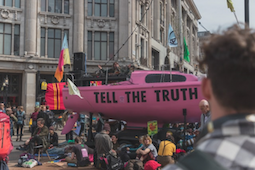ICN Media Course 6 - Using images

Image: Vatican Media
It may be a cliche, but it's true - Whether you're working in print or online - a good image is worth a thousand words. Here are a few tips to help you use pictures well in your media work.
Sourcing images.
Always check that you have permission to use a picture. Photographers earn their living from selling their work - so its important to make sure you have permission to use any image you publish with a story. It's one thing to post a picture from a newspaper or magazine on your personal Facebook page. But It's very risky and could be illegal to copy and publish that same image in a printed publication or commercial online site. You could end up being invoiced by a photographer or picture agency.
So - make sure you have permission to use any image you have been given. It's also courteous to give the photographer or agency providing the image a credit in the caption.
If you need a generic image - for example a snow scene to go with a poem about winter; flowers for a memorial piece and so forth - there are several websites out there offering free images. Unsplash is a good one. ( see: https://unsplash.com/ ) . Photographers starting out sometimes place examples of their work there. It's an opportunity for them to get exposure for their work. But if you do use an Unsplash picture don't forget to credit the photographer etc.
Most news services and press offices will provide images to go with press releases. VIPs also provide official photos of themselves.
Or - try taking your own pictures, of particular events or generic subjects.
Choosing images
A simple picture is usually better than one that is cluttered. Sometimes you can crop a picture to remove unnecessary features.
Editors generally don't like: backs of heads, (unless they are particularly significant) giant cheques, blurry images, badly composed shots etc.
The image has got to match the story.
If you are taking a film with your smartphone - it's likely to look much better if you hold the camera in a horizontal rather than vertical position.
Designing page
If you are laying out the page - consider whether the image should go on the left or right side of the page. It does make a difference!
Captions
Keep them brief - you don't want the caption to take up more space than the story. At the same time let people know who's in the picture, when and where it was taken - and the name of the photographer or source of the image.
For further reading see:
Using behavioural insights in visual communication: https://instituteforpr.org/a-picture-is-worth-a-thousand-words-using-behavioural-insights-in-visual-communication/
Image copyright: https://blog.hootsuite.com/understanding-image-copyright/


















